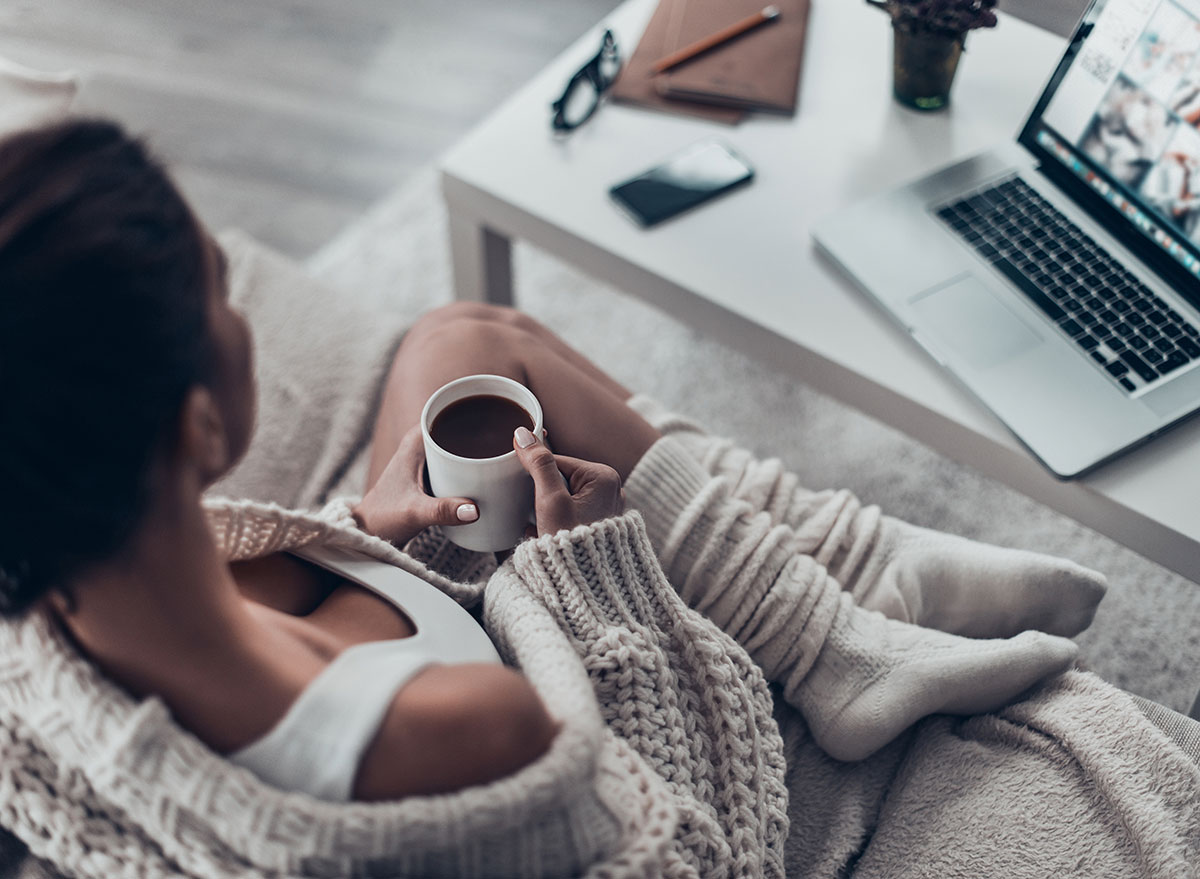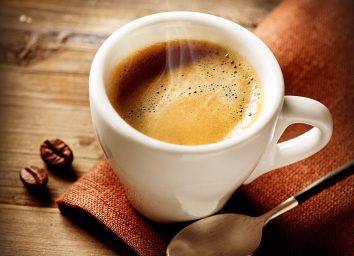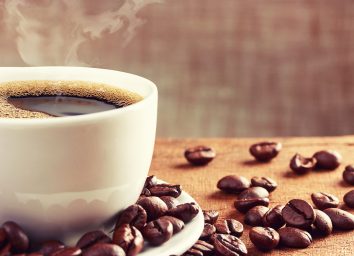The One Major Side Effect Caffeine Has On Your Sleep, Says Science

You—and a big chunk of the rest of the country—could stand to get more sleep. That isn’t an assumption—it’s an educated statement based on research highlighted in a new book, Better Sleep, Better You, co-authored by functional medicine pioneer Frank Lipman, MD, and Neil Parikh, co-founder and Chief Strategy Officer of Casper.
The mission behind their partnership, they say, was to “write a book that would finally get people in bed to get the rest they need.” And clearly, we need the help: 40 percent of Americans report occasional insomnia, 22 percent experience insomnia almost every night, and a whopping 70 percent of Americans aren’t getting enough sleep.
Our chronic sleep issues have many underlying causes, including our dependence on sleep-disrupting technology, being overworked and undernourished, and more. The worst part? Ignoring the fact that we aren’t getting enough sleep can have alarming consequences for our health.
How caffeine messes with your sleep
Ironically, one of the ways we deal with feeling sleepy—drinking caffeinated beverages—is actually contributing to our inability to power down at night. Don’t worry—you can loosen that death grip on your coffee mug and instead, follow this advice directly from Frank and Neil for curbing (not quitting) consumption:
We get it—you’re tired, dragging, fuzzy in the head, and need a boost. What could be more inviting than caffeine, one of the most perfect stimulants nature has ever created? It gives you an almost instant second (or third or fourth) wind, keeps your mind laster-focused, and potentially helps you burn more calories at the gym.
But when it comes to sleep? Total buzzkill. That’s because caffeine is a stimulant, and the way it revs you up is by blocking the receptors in your brain that recognize the sleep-inducing neurotransmitter adenosine. Adenosine is what builds up in your system as you accumulate waking hours, creating sleep pressure or the urge to sleep.
Caffeine basically stops that from happening, tricking the brain into believing it’s not tired. But the longer caffeine blocks adenosine, the more of it builds up in your system. When the effects of caffeine eventually wear off, all that backlogged adenosine comes rushing back into the brain, making you feel even more tired than before you had that cup of coffee/black tea/energy drink. They don’t call it crashing for nothing. Plus, caffeine also inhibits melatonin production, even more so than bright light.
So now you need caffeine to wake up and function, which makes you sleepier, which causes you to need more caffeine—aka the “caffeine causality loop.”
How to drink coffee and still get a good sleep
If you want to help your sleep, you need to catch that caffeine causality loop mid-stream and reset the rhythm. The way to do that is to be smarter about how much caffeine you’re having and when you’re having it. Some tips:
- Have a caffeine cap. We recommend having your last hit of caffeine no later than 1 p.m. Caffeine has a half-life of roughly five to seven hours, meaning that five to seven hours after you drink a cup of coffee, half the caffeine is still in your body. If you’re a slow metabolizer (see below), it could take even longer.
- Try cutting back. There’s a difference between that 200-milligram 20-ounce latte and a 50-milligram shot of espresso in terms of how long it takes the body to break down all that caffeine. A great solution could be switching to half-caf Americanos because you still get to feel like you’re drinking coffee all day, but at only 45 to 75 milligrams of caffeine a pop (because it’s just one shot of caffeine and one shot of decaf). Even three to four half-caf Americanos a day would come to around 150 milligrams total, versus the 500 to 600 milligrams of full-strength. We recommend keeping your total daily intake to 400 milligrams or less, the equivalent of four 8 oz. cups of coffee. However, if you determine that you are a slow metabolizer, you may want to reduce that number. You could also look for an alternative source, like L-theanine, an amino acid that can increase focus when taken as a supplement or consumed in green tea. Here’s This One Trick Will Help You Cut Down On Caffeine For Good.
- Be mindful of hidden caffeine. Caffeine pops up in all kinds of places, especially chocolate and certain medications. These sources count toward your total daily tally.
- Be honest with yourself. If you feel awful after you drink caffeine—most likely because you’re a slow metabolizer—then ask yourself why you’re reaching for it in the first place, especially if it’s affecting your sleep at night. You’ll find that as you follow your sleep-better protocol, you’ll feel less and less of a need for the caffeine crutch.
For a better night of sleep, avoid these Worst Foods for a Good Night’s Rest, According to Sleep Experts
Know your caffeine metabolism type
New research into how we process caffeine has unearthed that there are two kinds of people: Those who metabolize caffeine quickly (and can have a shot of espresso before bed with no issue falling asleep), and those who are slow metabolizers (the ones who drink a cup of coffee in the morning and feel anxious and jittery all day). This depends on which “caffeine gene” you carry.
- CYP1A2 codes for an enzyme that helps break down caffeine and contributes to its faster metabolization.
- CYP1A2 *1F is a mutation of CYP1A2 and does pretty much the opposite, resulting in the slower metabolism of caffeine.
Genome testing (like that offered by 23andMe, 3×4 Genetics, Genelex, and Gene Planet) can tell you which camp you fall into, but you can also pretty accurately figure it out through self-diagnosis: Ask yourself how you feel physically, mentally, and emotionally a few hours after you have caffeine. Slow metabolizers tend to feel sort of strung-out afterward (sometimes for up to nine hours!) while their speedier counterparts merely feel more energetic and alert.
Why you should try a “nappaccino”
For some, a nap can be a powerful sleep supplement. Research has shown that a well-timed, well-executed nap can boost alertness, mood, and productivity. Here’s one genius trick to help ensure you wake up feeling more alert:
“While we can’t take credit for the clever name,” says Frank and Neil, “we can pass along this suggestion, which has been doing the rounds on the sleep circuit and is backed up by anecdotal evidence.”
The nappaccino calls for drinking an 8-ounce cup of coffee before you take a nap. That way you’re not only heading off the drowsy-making adenosine build-up that caffeine contributes to, you’re also waking up just as the caffeine is kicking in, 20 to 25 minutes later. In theory, then, you’re reaping double-whammy energy-boosting benefits.
Adapted from BETTER SLEEP, BETTER YOU. Copyright © 2021 by Frank Lipman, MD, and Neil Parikh with Rachael Holtzman. Used with permission of Little, Brown Spark, an imprint of Little, Brown and Company. New York, NY. All rights reserved.








